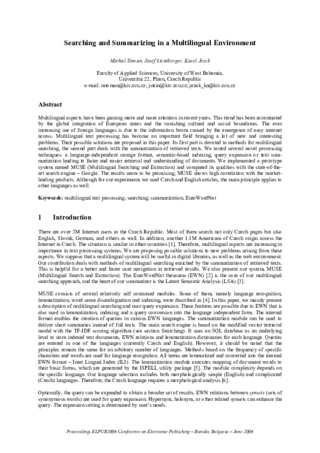Multilingual aspects are gaining more attention in recent years. This direction is further broadened by a global integration of the European states and vanishing cultural and social boundaries. The spread of foreign languages is even bigger with the information boom caused by an emergence of easy internet access. Multilingual text processing becomes an important area, which brings a lot of new and interesting problems. Their possible solutions are proposed in this paper. The first part of this contribution is devoted to methods for multilingual searching, the second part deals with summarization of retrieved texts. We tested some novel processing techniques: a language-independent storage format, semantic-based indexing, query expansion or text summarization leading to faster and easier retrieval and understanding of documents. We implemented a prototype system named MUSE (Multilingual Searching and Extraction) and evaluated its qualities against the state-of-the-art searching engine - Google. The results seem to be promising; MUSE shows high correlation with market-leading products. Although our experiments were performed on Czech and English articles, the main principle remains the same for other languages.
Toman, Michal, Josef Steinberger, and Karel Jezek. "Searching and Summarizing in a Multilingual Environment." In Digital Spectrum: Integrating Technology and Culture - Supplement to the Proceedings of the 10th International Conference on Electronic Publishing, 257-266. ELPUB. Bansko, Bulgaria, 2006.
